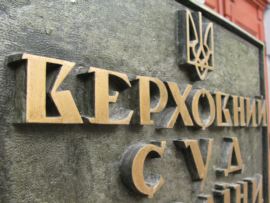Final Act for Supreme Court Saga?

The newspaper Kommersant Ukraine has reported that the Supreme Court awaits serious changes. Petro Pylypchuk whose election as Head of the Supreme Court in December 2011 was at the time called a compromise and temporary measure. is now reaching retirement age, and in a month and a half the Supreme Court plenum must elect a new Head. Kommersant reports that on Monday the High Qualification Commission recommended Leonid Fesenko, current Head of the High Specialized Court on Civil and Criminal Cases. Analysts suggest that with Fesenko’s appointment, the Supreme Court’s powers radically cut in July 2010 will be reinstated. In 2006 Fesenko was elected to parliament representing the Party of the Regions. He was appointed to his current post in August 2010 by President Yanukovych as part of the latter’s “judicial reform”.
Kommersant writes that Fesenko will most probably become head of the Supreme Court without any competition. It notes that such a scenario has already been played out a few times since Viktor Yanukovych became President, for example, with the election of the current Head of the High Administrative Court Ihor Temkyzhev. In November 2011 Temkyzhev, who had no experience of administrative jurisprudence, was transferred by a decision of the Verkhovna Rada from his post as Head of the Dnipropetrovsk Economic Court of Appeal to post as judge of the High Administrative Court. A week later the Council of Judges of Administrative Courts recommended him as Head of the High Administrative Court. He was the only candidate put forward for the post.
Fesenko himself says that he plans to seek a return of the Supreme Court’s powers, while Kommersant reports that the Party of the Regions are not against this.
As reported in December last year, the election then of Petro Pylypchuk seemed the culmination of efforts to ensure the removal of Vasyl Onopenko from the post of Head of the Supreme Court, Mr Onopenko’s tenure had expired in September 2011, but up till then he had been expected to stand for re-election with a very strong likelihood of receiving majority support from his fellow judges. He was widely known to be unacceptable to the President’s Administration. This was commented upon in the Parliamentary Assembly of the Council of Europe’s October 2010 report in connection with concern, shared by the Venice Commission, over drastically reduced powers for the Supreme Court. The PACE report stated that “these new provisions are controversial and have led to allegations that they were inspired by political power games and revenge, as the chairperson of the Supreme Court is widely considered to be close to former Prime Minister, Yulia Timoshenko”
Although the Supreme Court’s role remains reduced, some powers have since been reinstated. Throughout 2011 there were a number of events and developments which many commentators interpreted as aimed at ousting Onopenko.
Yevhen Korniychuk, former Deputy Justice Minister in Yulia Tymoshenko’s government and Vasyl Onopenko’s son-in-law was arrested on 22 December 2010 on the day that his wife gave birth to their third child. The arrest was condemned by a number of lawyers within Ukraine, and Korniychuk’s case was one of four identified as of particular concern in the Danish Helsinki Committee’s Second Legal Monitoring Report.
Mr Korniychuk was released in February on a signed undertaking not to leave Kyiv. The release came after a meeting between the President and Vasyl Onopenko, then Head of the Supreme Court and Korniychuk’s father-in-law. At the same time, a rather strange criminal investigation initiated against Onopenko’s elder daughter, which was deemed by the investigators to require a search of Onopenko’s home, was terminated.
On 30 November 2011 the Prosecutor General’s Office reduced the charges against Yevhen Korniychuk. Then on 9 December the Pechersky District Court in Kyiv amnestied him. The same court which in late December 2010 had first refused to remand Korniychuk in custody, but then “changed its mind” and remanded him for two months, now found that his three underage children and lack of any criminal record, as well, obviously, as the change in the criminal charges, allowed it to apply the amnesty. The court also rejected the application to demand compensation for losses to the State supposedly inflicted by Korniychuk.
The 9 December court ruling came a day after the District Administrative Court in Kyiv revoked its own ban imposed in September on holding the election for new Head of the Supreme Court. It also coincided with public statements from Vasyl Onopenko indicating that he would probably not stand for office.
The three other politicians whose cases were analyzed by the Danish Helsinki Committee: Yulia Tymoshenko, Yury Lutsenko and Valery Ivashchenko have received quite different treatment from the same Pechersky District Court
As mentioned, the District Administrative Court in Kyiv back in September 2011 placed a ban on holding the election for a new Head of the Supreme Court. This was supposedly on the application of a potential candidate. A law passed by parliament on 20 October opened the way for this candidate – Ihor Samsin, Head of the High Qualification Commission of Judges - to take part in the election. Political analysts suggest that Samsin was the candidate favoured by the President’s Administration. There was, however, rebellion among the judges’ corps of the Supreme Court. According to Serhiy Vysotsky, the President’s Administration then tried to push for the election of the Head of the Constitutional Court, . Anatoly Holovin. This also aroused the judges’ resistance. Petro Pylypchuk was widely admired by his colleagues who seemingly had no problem voting for him.
New information from the article at Kommersant Ukraine





